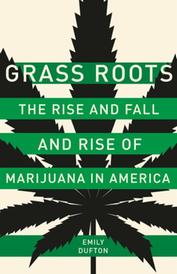
|
|
| photo: Travis S. Pratt | |
Emily Dufton holds a Ph.D. in American Studies from George Washington University and lives near Washington, D.C. Her book Grass Roots: The Rise and Fall and Rise of Marijuana in America is published by Basic Books (December 5, 2017)
On your nightstand now:
Alice Waters's Coming to My Senses: The Makings of a Counterculture Cook. It's fantastic.
Favorite book when you were a child:
I had so many, and I'm rediscovering many of them now with my own son. As a little kid, I loved Dr. Seuss and can still recite How the Grinch Stole Christmas by heart, but as I grew older, I was attracted to a lot of those books published in the 1970s and '80s that featured some pretty intense characters and scenes--some of which are downright disturbing when I reread them 20 years later. I loved Sylvia Cassedy's Behind the Attic Wall, and that book--about a lonely girl who befriends talking, moving, haunted dolls--is crazy. I also read and reread Somebody's Horse by Dorothy Nafus Morrison, about an abandoned girl who finds and saves an abandoned horse in Wyoming. Looking back on it now, I realized that I was really attracted to stories of troubled young girls who find homes and meaning in impossible places and with odd companions. Who needs therapy when you have children's literature? On the more upbeat side, I loved the Little House series and Brian Jacques's Redwall books, so there was some triumph and love in the midst of all that abandonment and sorrow.
Your top five authors:
I have to split this answer into two sections: the authors I loved most when I was at my most impressionable, and the authors I've come to love today.
When I was 15 and starting to understand that writing was what I wanted to do professionally, I was Kurt Vonnegut's biggest fan. I worshiped him--Vonnegut became my moral compass, and I judged the world, and good writing, from his books. But I was also deeply inspired by Joan Didion, John Steinbeck, Annie Dillard and Ernest Hemingway. They taught me narrative and language and syntax and structure, and how a beautiful scene, rife with emotion, could be created with just a few strokes. I owe the creation of much of my voice to reading, and rereading, them through my teenage years.
Today, my tastes are more varied. I read everything Haruki Murakami publishes. I love Toni Morrison. Katherine Boo and Laura Hillenbrand do amazing work with nonfiction. I read a lot, and there are so many talented writers working right now. Could I name my 50 top authors instead?
Book you've faked reading:
Book I faked finishing: War and Peace. Started it when I was in the Peace Corps, never finished. Maybe someday. Book you're an evangelist for:
Book you're an evangelist for:
I love anything written by M.F.K. Fisher. When we think of extremely talented female writers, her name rarely comes up, which is a shame. I suppose this is because she's primarily considered a food writer, even though her work covers such a wealth of other subjects--including travel, expatriatism, philosophy, love, the joys and pains of the human condition. If we were to categorize her writing solely as that of appetites, she's less of a writer concerned only with food, and more of a writer concerned with all unquenchable human hungers: for love, for belonging, for home and for meaning. I can't recommend her books enough.
Book you've bought for the cover:
Paris Stories from the Everyman's Pocket Classics series. Lovely rainbow spine, hilarious picture on the back of a man and a poodle sitting side by side at a cafe. Plus, I'm an easy sell: I'll read anything set in France.
Book that changed your life:
Martin Torgoff's Can't Find My Way Home: America in the Great Stoned Age, 1945-2000. I bought this book on a whim my last year of college and read it in a two-day binge. I had never encountered such an intriguing, entertaining and fascinating history of American counterculture, told entirely through the lens of drug use. Torgoff taught me that history could be fun, and that certain substances, actions and ideas could provide a new, necessary and illuminating perspective on how American history has unfolded, and who we as Americans really are. Without Torgoff, I never could have written Grass Roots.
Five books you'll never part with:
I've moved a lot over the years, but there are certain books that always come along. The first is my signed copy of Kurt Vonnegut's Bluebeard, second is my signed copy of Joan Didion's After Henry, third and fourth are my heavily annotated copies of Torgoff's Can't Find My Way Home and Moby-Dick from college, and the newest addition is my signed copy of Bruce Springsteen's autobiography, Born to Run.
Book you most want to read again for the first time:
The Sense of an Ending by Julian Barnes. I would love to watch that mystery unfold anew.

